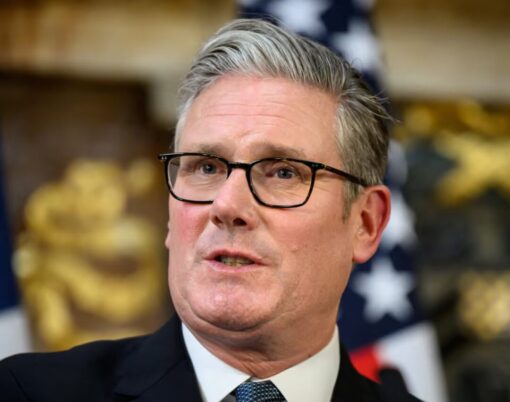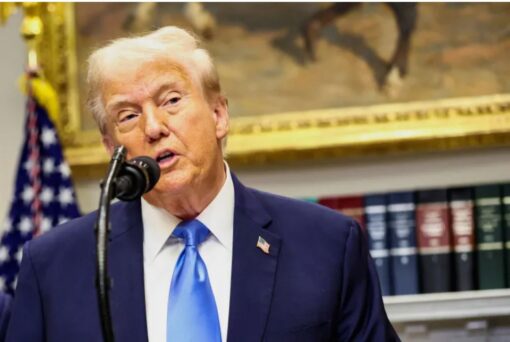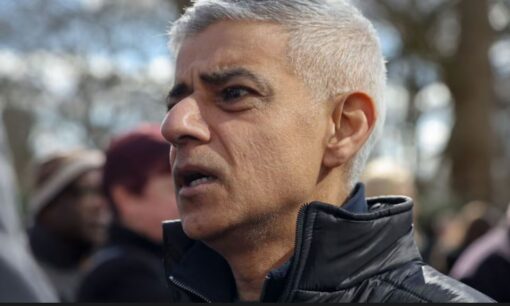Britain’s Prime Minister, Keir Starmer, delivered a rare public rebuke to former US President Donald Trump, dismissing his recent claims that London might introduce sharia law as “nonsense.”
Starmer’s remarks defended London Mayor Sadiq Khan and highlighted the growing tension between US and UK political narratives regarding immigration, religion, and urban governance.
At the United Nations earlier this week, Trump launched a sweeping critique of European immigration policies, singling out London in particular.

In a statement that drew immediate attention and criticism, he falsely asserted: “Now they want to go to sharia law,” while describing Khan as a “terrible, terrible mayor.”
Starmer directly countered Trump’s assertion during an interview with ITV London, emphasizing the absurdity of the claim. “The idea of the introduction of sharia law is nonsense, and Sadiq Khan is a very good man,” he said. Starmer further clarified: “There are few things I disagree with Trump on, but I’m very clear, this is one of them,” signaling a rare divergence from his generally measured approach to US-UK political relations.
Sadiq Khan, who became London’s first Muslim mayor in 2016, has since won two additional mayoral elections, demonstrating the strong mandate he holds in the city.
Trump has long highlighted personal electoral mandates as a mark of political legitimacy, yet his criticisms of Khan ignore the mayor’s substantial support among Londoners. Khan’s electoral success underscores his popularity and the city’s endorsement of his policies on safety, housing, and urban governance.
Trump’s latest comments represent the continuation of a long-running public feud that dates back to at least 2017. That year, Khan criticized Trump for proposing a travel ban targeting majority-Muslim countries, a policy widely condemned internationally for its discriminatory nature.
Since then, the two figures have frequently clashed in public, with Trump labeling Khan a “nasty person” and asserting he had “done a terrible job” as London mayor.
Right-wing commentators in the US have also repeatedly highlighted crime statistics and demographic changes in London as points of criticism, feeding into broader political narratives about urban governance and multiculturalism.
The timing of Trump’s comments was particularly notable. Just a week prior, during his second unprecedented state visit to the UK, Trump had praised the US-UK relationship and enjoyed extensive British pageantry, including a white-tie banquet at Windsor Castle hosted by King Charles.

The sharp turn from praise to public criticism drew widespread attention and raised questions about the motivations behind Trump’s statements. Observers suggest that Trump’s remarks may reflect domestic political considerations aimed at his US audience, rather than any substantive critique of UK policy.
In response to Trump’s assertions, Mayor Khan condemned the remarks as “racist, sexist, misogynistic, and Islamophobic.” He cited data showing a record number of Americans seeking UK citizenship, particularly in London, as evidence that the city’s values continue to attract those seeking liberal governance, diversity, and the protection of minority rights.
Khan emphasized that London remains a city committed to fundamental democratic principles, including adherence to the rule of law and respect for human rights.
The dispute over Trump’s claim also highlights broader issues surrounding misinformation and political rhetoric. Experts note that false claims about sharia law or other religious legal systems can fuel prejudice, stoke social tensions, and misrepresent the governance of diverse cities.
London, with its long-standing multicultural population and established secular legal system, operates under the UK’s constitutional framework, which guarantees equal treatment under the law and explicitly forbids the implementation of parallel legal systems based on religious law.
Starmer’s rare rebuke underscores the importance the UK government places on defending its civic institutions and elected officials against what it views as politically motivated falsehoods.
By publicly supporting Khan, Starmer reinforces the credibility of London’s governance and counters misleading narratives propagated by foreign political figures.
Analysts suggest that Starmer’s remarks are also a strategic message to both domestic and international audiences, emphasizing the UK’s commitment to evidence-based policy and respectful political discourse.
The ongoing feud between Trump and Khan has evolved over time, encompassing debates over immigration, security, public safety, and political representation.
Khan’s tenure as mayor has been characterized by efforts to reduce crime, improve public transportation, and address housing shortages. Trump’s criticisms, however, often focus on broader cultural and ideological issues, framing Khan’s policies as emblematic of broader failures in liberal urban governance.
Public reaction in the UK to the latest exchange has been largely supportive of Starmer and Khan. Social media discussions and opinion polls indicate that Londoners reject the notion that sharia law could be introduced, while emphasizing pride in the city’s diversity and the mayor’s leadership.
The debate has also reignited conversations about the responsibilities of public figures to avoid spreading misinformation that could exacerbate social divisions.
Political commentators note that the Trump-Khan conflict also illustrates the challenges of transatlantic relations in an era of populist politics and social media-driven narratives.
False or exaggerated claims, particularly when made by high-profile figures like Trump, can influence public perception internationally, requiring measured responses from leaders such as Starmer to maintain diplomatic and civic credibility.
The broader implications of this dispute extend beyond the immediate US-UK context. Urban centers around the world are grappling with questions of diversity, governance, and religious inclusion.
Misrepresentations like Trump’s claim risk undermining public confidence in democratic institutions and can provide ammunition for extremist or xenophobic movements.
In this light, Starmer’s defense of Khan represents not only a domestic political stance but also a commitment to upholding inclusive democratic principles on the global stage.
Khan himself has leveraged the attention to highlight London’s global appeal. He notes that Americans, especially those with liberal values, continue to view London as a city that champions human rights, embraces diversity, and provides a stable, law-abiding environment.
By contrasting Trump’s rhetoric with these facts, Khan reinforces his message that London’s governance remains progressive, inclusive, and evidence-based.
The UK government, while generally cautious in responding to foreign leaders’ criticisms, appears to view Trump’s comments as an outlier requiring explicit rebuttal.

Starmer’s rare intervention reflects the need to correct misinformation that could otherwise distort international perceptions and undermine the credibility of London’s municipal leadership.
The exchange between Donald Trump and UK political leaders underscores the intersection of misinformation, international relations, and urban governance.
Keir Starmer’s public defense of Sadiq Khan not only refutes false claims about sharia law in London but also reaffirms the city’s commitment to diversity, democracy, and the rule of law.
As both Trump and Khan continue to engage in public discourse, this feud highlights the ongoing importance of accurate reporting, responsible political rhetoric, and principled leadership in maintaining trust both domestically and internationally.


